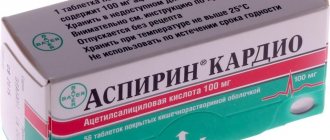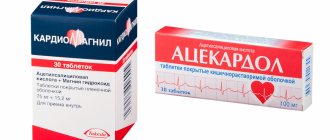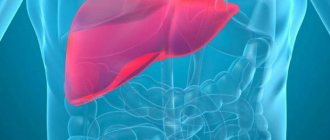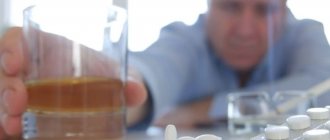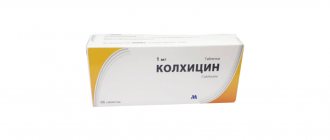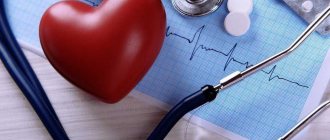Aspirin Cardio is used to prevent pathologies of the heart and blood vessels. It prevents the appearance of thrombotic masses and restores the walls of the vascular bed. The medication is sold in tablet form with a protective coating. This form eliminates irritation of the gastric mucosa and allows you to take the medicine in long courses. Enteric-coated tablets are suitable for patients who have concomitant gastritis or gastric ulcers.
Aspirin Cardio 100 mg
What is it used for?
Aspirin Cardio is used to thin the blood. This is a non-steroidal anti-inflammatory drug that has a pronounced antiplatelet effect. The drug is used to prevent pathologies of the heart and vascular bed, thrombosis.
Indications for use of the product:
- Angina attacks;
- Prevention of subsequent attacks of myocardial infarction;
- Prevention of hypoxic brain damage;
- The recovery period after vascular surgery, when the risk of thrombosis is quite high (coronary artery bypass grafting, angioplasty and others).
The drug is prescribed by a cardiologist after a complete examination of the patient.
Dosage Forms
The medication is available in tablet form. The tablets have a special protective coating that is not subject to dissolution in the acidic environment of the stomach. The shell of the tablet form dissolves only in the cavity of the duodenum. This form allows you to prevent damage to the gastric mucosa during long-term use. The medicine is also suitable for patients with concomitant diseases of the digestive tract.
Dosages of tablets can be as follows:
- 100 mg,
- 300 mg.
People often wonder who the manufacturer of Aspirin Cardio is. The medicine is produced by Bayer (Germany).
Asirin Cardio tablets
How and when to take Aspirin Cardio?
The tablets are taken half an hour before meals with ½-1 glass of water. The tablet form must not be chewed or crushed, as the coating is damaged, which prevents acetylsalicylic acid from irritating the gastric mucosa. The medicine is taken 1 tablet daily or every other day. The drug is used in long courses. The duration of course therapy is determined by the doctor.
Aspirin Cardio 100, 300 mg: instructions for use in various situations:
- Prevention of recurrent myocardial infarction, angina attack - 100-300 mg per day.
- Unstable angina is present, which can lead to a heart attack -
200-300 mg. To quickly get the effect of therapy, you should crush or chew the tablet form; when the risk of acute heart attack is eliminated, you should take the medication for another 30 days at 200-300 mg per day; It is recommended to drink 100-300 mg per day for the entire second month of therapy.
- Prevention of repeated ischemia of the brain or heart - 100-300 mg per day;
- Postoperative period or recovery after invasive procedures - 100-300 mg per day.
When one or more dosages have been missed by the patient, it is necessary to take the drug as soon as possible. If the patient remembers the missed dose, when should he take the next pill:
- First take the planned dose;
- After a while, they take the missed dose so that there is no overdose.
You should take Aspirin Cardio only according to the instructions, as recommended by your doctor.
Aspirin Cardio, 300 mg, enteric-coated tablets, 20 pcs.
Bayer, Germany
Price from 50₽
Aspirin Cardio, 100 mg, enteric-coated tablets, 28 pcs.
Bayer, Germany
Price from 81₽
Aspirin Cardio, 100 mg, enteric-coated tablets, 56 pcs.
Bayer, Germany
Price from 244₽
There are contraindications. Specialist consultation is required.
Aspirin cardio, tablets 100 mg, 28 pcs.
Manufacturer
Bayer Pharma AG, Germany
Compound
1 tablet:
- acetylsalicylic acid 100 mg or 300 mg;
Excipients:
cellulose, powder 10 mg or 30 mg,
corn starch 10 mg or 30 mg;
shell:
methacrylic acid and ethyl acrylate copolymer 1:1 (Eudragit L30D) 7.857 mg or 27.709 mg,
polysorbate 80 0.186 mg or 0.514 mg,
sodium lauryl sulfate 0.057 mg or 0.157 mg,
talc 8.100 mg or 22.380 mg,
triethyl citrate 0.800 mg or 2.240 mg.
pharmachologic effect
Pharmgroup:
NSAIDs.
Pharmaceutical action:
The mechanism of the antiplatelet action of acetylsalicylic acid (ASA) is based on the irreversible inhibition of cyclooxygenase (COX-1), as a result of which the synthesis of thromboxane A2 is blocked and platelet aggregation is suppressed.
The antiplatelet effect is most pronounced in platelets, since they are not able to re-synthesize cyclooxygenase. It is believed that ASA has other mechanisms of suppressing platelet aggregation, which expands the scope of its use in various vascular diseases.
ASA also has anti-inflammatory, analgesic and antipyretic effects.
Indications
— Primary prevention of acute myocardial infarction in the presence of risk factors (for example, diabetes mellitus, hyperlipidemia, arterial hypertension, obesity, smoking, old age) and recurrent myocardial infarction; - Unstable angina (including suspicion of acute myocardial infarction) and stable angina; — Prevention of stroke (including in patients with transient cerebrovascular accident); — Prevention of transient cerebrovascular accident; — Prevention of thromboembolism after operations and invasive interventions on vessels (for example, coronary artery bypass grafting, carotid endarterectomy, arteriovenous bypass grafting, angioplasty and stenting of the coronary arteries, carotid angioplasty) — Prevention of deep vein thrombosis and thromboembolism of the pulmonary artery and its branches ( including long-term immobilization as a result of extensive surgery).
Use during pregnancy and breastfeeding
Inhibition of prostaglandin synthesis may have negative effects on pregnancy and embryonic or fetal development. The use of large doses of salicylates (more than 300 mg/day; we are talking about the usual doses of ASA from 500 mg as an anesthetic) in the first trimester of pregnancy is associated with an increased incidence of fetal defects (cleft palate, heart defects). The administration of salicylates in the first trimester of pregnancy is contraindicated.
In the third trimester of pregnancy, salicylates in high doses (more than 300 mg/day; we are talking about usual doses of ASA from 500 mg as an anesthetic) can cause inhibition of labor, premature closure of the ductus arteriosus in the fetus, increased bleeding in the mother and fetus, and administration immediately before birth may cause intracranial hemorrhage, especially in premature infants. The administration of salicylates in the third trimester of pregnancy is contraindicated.
In the second trimester of pregnancy, salicylates can be prescribed only taking into account a strict assessment of the risks and benefits for the mother and fetus, preferably in doses not exceeding 150 mg/day and for a short period of time.
Use during lactation:
Salicylates and their metabolites pass into breast milk in small quantities. Accidental intake of salicylates during lactation is not accompanied by the development of adverse reactions in the child and does not require cessation of breastfeeding. However, with long-term use of the drug or when it is prescribed in a high dose, breastfeeding should be stopped immediately.
Contraindications
- Hypersensitivity to acetylsalicylic acid, excipients in the composition of the drug Aspirin cardio and other NSAIDs - Bronchial asthma induced by taking salicylates and other NSAIDs; combination of bronchial asthma, recurrent polyposis of the nose and paranasal sinuses and intolerance to ASA - Erosive and ulcerative lesions of the gastrointestinal tract (in the acute stage) - Gastrointestinal bleeding - Hemorrhagic diathesis - Combined use with methotrexate at a dose of 15 mg per week or more - Pregnancy (I and III trimester) and lactation period - Childhood and adolescence (up to 18 years) - Severe renal failure (creatinine clearance (CC) less than 30 ml/min.) - Severe liver failure (class B and higher on the Child-Pugh scale ) — Chronic heart failure III-IV functional class according to the NYHA classification
With caution: For gout, hyperuricemia, because ASA in low doses reduces the excretion of uric acid; It should be borne in mind that ASA in low doses can provoke the development of gout in predisposed patients (those with reduced excretion of uric acid)
If you have a history of gastrointestinal ulcers or gastrointestinal bleeding
If liver function is impaired (below class B on the Child-Pugh scale)
In case of impaired renal function (creatinine clearance more than 30 ml/min), as well as in circulatory disorders resulting from atherosclerosis of the renal arteries, congestive heart failure, hypovolemia, extensive surgery, sepsis, cases of massive bleeding, since in all of these cases ASA may increase the risk development of acute renal failure and renal dysfunction.
For bronchial asthma, chronic respiratory diseases, hay fever, nasal polyposis, drug allergies, including NSAIDs (analgesics, anti-inflammatory, antirheumatic drugs)
In the second trimester of pregnancy
In case of proposed surgical intervention (including minor ones, for example, tooth extraction), since ASA may cause a tendency to develop bleeding for several days after taking the drug. When using Aspirin Cardio in combination with the following drugs (see section “Interaction with other drugs” ):
- with methotrexate at a dose of less than 15 mg per week; - with anticoagulant, thrombolytic or other antiplatelet drugs - with NSAIDs and salicylic acid derivatives in high doses; - with digoxin; - with hypoglycemic agents for oral administration (sulfonylurea derivatives) and insulin; - with valproic acid; -with alcohol (alcoholic drinks in particular); - with selective serotonin reuptake inhibitors; - with ibuprofen.
Side effects
From the digestive system: the most common symptoms are nausea, heartburn, vomiting, abdominal pain; rarely - ulcers of the mucous membrane of the stomach and duodenum; very rarely - perforated ulcers of the mucous membrane of the stomach and duodenum, gastrointestinal bleeding (with corresponding clinical symptoms and laboratory changes), transient liver dysfunction with increased activity of “liver” transaminases.
From the hematopoietic system: the administration of ASA is accompanied by an increased risk of bleeding due to the inhibitory effect of ASA on platelet aggregation. An increase in the frequency of perioperative (intra- and postoperative) bleeding, hematomas (bruises), nosebleeds, bleeding gums, and bleeding from the genitourinary tract has been recorded. There have been reports of serious bleeding events, which include gastrointestinal bleeding and cerebral hemorrhage (especially in patients with hypertension who have not achieved blood pressure (BP) targets and/or are receiving concomitant anticoagulant therapy), which in selected cases may be life-threatening in nature (see section “Special instructions”).
Bleeding can lead to the development of acute or chronic posthemorrhagic/iron deficiency anemia (for example, due to hidden bleeding) with corresponding clinical and laboratory signs and symptoms (asthenia, pallor, hypoperfusion).
There are reports of cases of hemolysis and hemolytic anemia in patients with severe forms of glucose-6-phosphate dehydrogenase deficiency.
Allergic reactions: hypersensitivity reactions with corresponding laboratory and clinical manifestations, such as asthmatic syndrome (bronchospasm), mild to moderate reactions of the skin, respiratory tract, gastrointestinal tract and cardiovascular system, including symptoms such as skin rash , skin itching, urticaria, Quincke's edema, rhinitis, swelling of the nasal mucosa, cardiorespiratory distress syndrome, as well as severe reactions, including anaphylactic shock.
From the central nervous system (CNS): there are reports of cases of dizziness, hearing loss, headache, tinnitus, which may be a sign of a drug overdose (see section “Overdose”).
From the urinary system: there are reports of cases of renal dysfunction and acute renal failure.
Interaction
When used simultaneously, ASA enhances the effect of the following drugs; If it is necessary to simultaneously prescribe ASA with the listed drugs, the need to reduce the dose of these drugs should be considered:
-methotrexate by reducing renal clearance and displacing it from protein binding; the combination of ASA with methotrexate is accompanied by an increased incidence of side effects from the hematopoietic organs; the use of Aspirin® Cardio together with methotrexate is contraindicated if the dose of the latter exceeds 15 mg per week (see section “Contraindications”) and can be used with caution at a dose of methotrexate less than 15 mg per week;
heparin and indirect anticoagulants due to disruption of platelet function and displacement of indirect anticoagulants from binding with proteins;
- when used simultaneously with anticoagulants, thrombolytic and antiplatelet agents (ticlopidine), there is an increase in the risk of bleeding as a result of the synergism of the main therapeutic effects of the drugs used;
- when used simultaneously with drugs that have anticoagulant, thrombolytic or antiplatelet effects, an increased damaging effect on the mucous membrane of the gastrointestinal tract is observed;
-selective serotonin reuptake inhibitors, which may lead to an increased risk of bleeding from the upper gastrointestinal tract (synergism with ASA)
-digoxin due to a decrease in its renal excretion, which can lead to its overdose
-hypoglycemic agents for oral administration (sulfonylurea derivatives) and insulin due to the hypoglycemic properties of ASA itself in high doses and displacing sulfonylurea derivatives from association with blood plasma proteins; this must be kept in mind when prescribing ASA to patients with diabetes mellitus receiving the listed medications
- when used simultaneously with valproic acid, its toxicity increases due to displacement from the connection with blood plasma proteins;
-NSAIDs and salicylic acid derivatives in high doses (increased risk of ulcerogenic effect and bleeding from the gastrointestinal tract as a result of synergistic action);
-Ethanol (alcoholic beverages) (increased risk of damage to the mucous membrane of the gastrointestinal tract and prolongation of bleeding time as a result of the mutual enhancement of the effects of ASA and ethanol).
The simultaneous administration of ASA in high doses may weaken the effect of the drugs listed below. If it is necessary to simultaneously prescribe ASA with the listed drugs, you should consider the need to adjust the dose of the drugs listed below:
- any diuretics (when used together with ASA in high doses, a decrease in glomerular filtration rate is observed as a result of a decrease in the synthesis of prostaglandins in the kidneys);
- angiotensin-converting enzyme (ACE) inhibitors (a dose-dependent decrease in glomerular filtration rate (GFR) is noted as a result of inhibition of prostaglandins that have a vasodilatory effect, respectively, a weakening of the hypotensive effect. The clinical significance of the decrease in GFR is noted with a daily dose of ASA more than 160 mg. In addition, there is a decrease in the positive cardioprotective effect of ACE inhibitors prescribed to patients for the treatment of chronic heart failure. This effect is also manifested when used together with ASA in large doses);
- drugs with uricosuric action - benzbromarone, probenecid (reduced uricosuric effect due to competitive suppression of renal tubular excretion of uric acid).
When used simultaneously with ibuprofen, antagonism is observed against the irreversible platelet inhibition caused by the action of ASA, which leads to a decrease in the cardioprotective effects of ASA. Therefore, the combination of ASA with ibuprofen is not recommended in patients with an increased risk of cardiovascular disease.
When used simultaneously with systemic glucocorticosteroids (GCS) (with the exception of hydrocortisone or other GCS used for replacement therapy of Addison's disease), there is an increase in the elimination of salicylates and, accordingly, a weakening of their effect. When using GCS and salicylates in combination, it should be remembered that during treatment the level of salicylates in the blood is reduced, and after discontinuation of GCS, an overdose of salicylates is possible.
How to take, course of administration and dosage
It is advisable to take ASPIRIN CARDIO tablets before meals with plenty of liquid. ASPIRIN CARDIO tablets are taken once a day. ASPIRIN CARDIO is intended for long-term use. The duration of therapy is determined by the doctor.
— Primary prevention of acute myocardial infarction in the presence of risk factors: 100 mg/day or 300 mg every other day.
— Prevention of recurrent infarction, stable and unstable angina: 100-300 mg/day.
- Unstable angina (if the development of acute myocardial infarction is suspected): the initial dose of Aspirin Cardio 100-300 mg (the first tablet must be chewed for faster absorption) should be taken by the patient as soon as possible after the development of acute myocardial infarction is suspected. In the next 30 days after the onset of myocardial infarction, a dose of 200-300 mg/day should be maintained. After 30 days, appropriate therapy should be prescribed to prevent recurrent myocardial infarction.
— Prevention of stroke and transient cerebrovascular accident: 100-300 mg/day.
— Prevention of thromboembolism after operations and invasive interventions on blood vessels: 100-300 mg/day.
— Prevention of deep vein thrombosis and thromboembolism of the pulmonary artery and its branches: 100-200 mg/day or 300 mg every other day.
What to do if you miss one or more doses of the drug:
Take the missed pill as soon as you remember and then continue taking it as usual. To avoid doubling the dose, do not take the missed tablet if it is near the time of your next tablet.
Features of the action of the drug Aspirin Cardio when first taken and when discontinued:
No specific effects of the drug were observed during the first dose or its withdrawal.
Overdose
Salicylate intoxication (develops when taking ASA at a dose of more than 100 mg/kg/day for more than 2 days) can result from prolonged use of toxic doses of the drug as part of improper therapeutic use of the drug (chronic intoxication) or a single accidental or intentional intake of a toxic dose of the drug adults or children (acute intoxication).
Symptoms of chronic intoxication with salicylic acid derivatives are nonspecific and are often difficult to diagnose. Mild intoxication usually develops only after repeated use of large doses of the drug and is manifested by dizziness, tinnitus, hearing loss, increased sweating, nausea and vomiting, headache and confusion. These symptoms disappear after reducing the dose of the drug. Tinnitus may appear when the concentration of ASA in the blood plasma is from 150 to 300 mcg/ml. More severe symptoms appear when plasma ASA concentrations are above 300 mcg/ml.
The main manifestation of acute intoxication is a severe disturbance of the acid-base state, the manifestations of which may vary depending on the age of the patient and the severity of intoxication. In children, the most typical development is metabolic acidosis. Treatment of intoxication is carried out in accordance with accepted standards and depends on the severity of intoxication and the clinical picture and should be aimed mainly at accelerating the elimination of the drug and restoring the water-electrolyte balance and acid-base state.
Mild to moderate overdose symptoms:
Dizziness, tinnitus, hearing impairment, increased sweating, nausea, vomiting, headache, confusion, profuse sweating, tachypnea, hyperventilation, respiratory alkalosis.
Treatment: gastric lavage, repeated intake of activated carbon, forced alkaline diuresis, restoration of water-electrolyte balance and acid-base state.
Symptoms of moderate to severe overdose: - respiratory alkalosis with compensatory metabolic acidosis; - hyperpyrexia (extremely high body temperature); — respiratory disorders: hyperventilation, non-cardiogenic pulmonary edema, respiratory depression, asphyxia; - disorders of the cardiovascular system: cardiac arrhythmias, arterial hypotension, depression of cardiac activity; - disturbances in water and electrolyte balance: dehydration, impaired renal function from oliguria up to the development of renal failure, characterized by hypokalemia, hypernatremia, hyponatremia; - impaired glucose metabolism: hyperglycemia, hypoglycemia (especially in children), ketoacidosis; - tinnitus, deafness; - gastrointestinal bleeding; - hematological disorders: from inhibition of platelet aggregation to coagulopathy, prolongation of prothrombin time, hypoprothrombinemia; - neurological disorders: toxic encephalopathy and depression of central nervous system function (drowsiness, confusion, coma, convulsions).
Treatment: immediate hospitalization in specialized departments for emergency treatment - gastric lavage, repeated intake of activated charcoal, forced alkaline diuresis, hemodialysis, restoration of water-electrolyte balance and acid-base status, symptomatic therapy.
Special instructions
The drug Aspirin Cardio should be used as prescribed by a doctor.
ASA can provoke bronchospasm, as well as cause attacks of bronchial asthma and other hypersensitivity reactions. Risk factors include a history of bronchial asthma, hay fever, nasal polyposis, chronic respiratory diseases, and allergic reactions to other drugs (for example, skin reactions, itching, urticaria).
The inhibitory effect of ASA on platelet aggregation persists for several days after administration, and therefore may increase the risk of bleeding during surgery or in the postoperative period. If it is necessary to absolutely exclude bleeding during surgery, it is necessary, if possible, to completely abandon the use of ASA in the preoperative period.
Exceeding the dose of ASA is associated with a risk of gastrointestinal bleeding.
Overdose is especially dangerous in elderly patients.
In severe forms of glucose-6-phosphate dehydrogenase deficiency, ASA can cause hemolysis and hemolytic anemia. Factors that may increase the risk of hemolysis include fever, acute infections and high doses of the drug.
Impact on the ability to drive a car/moving machinery
Taking Aspirin®Cardio does not affect the ability to drive a car or drive machinery.
Release form
Aspirin cardio tablets, enteric-coated
Storage conditions
At a temperature not exceeding 25 °C
Best before date
5 years
Active substance
Acetylsalicylic acid
Dosage form
pills
Purpose
For adults, Pregnant women only in the second trimester as prescribed by a doctor
Indications
Prevention of heart attacks and strokes, Prevention of thrombosis, cerebrovascular accident, Angina pectoris
Information in the State Register of Medicines
Go
Barcode and weight
Barcode: 4008500130407 Weight: 0.013 kg
Is it allowed for pregnant and breastfeeding women?
According to studies, drugs related to inhibitors of prostaglandin production provoke miscarriages and embryonic malformations. No such effects have been observed when using salicylic acid in pregnant women. The drug is still not indicated in the first trimester, since during this period all organs and systems are formed.
In the 2nd trimester of pregnancy, the medication can be used if the benefit to the woman outweighs the possible risks to the embryo. The dosage of the drug and the duration of course therapy should be minimal.
In the 3rd trimester of pregnancy, the medicine can reduce labor, which can be dangerous for the mother and the embryo. The medication also reduces the blood's ability to clot. This can lead to heavy bleeding during childbirth. Consequences in the fetus when using Aspirin in the 3rd trimester:
- Cardiopulmonary intoxication, early closure of the ductus arteriosus, pulmonary hypertension;
- Insufficient kidney function.
For these reasons, the medication should not be used on the eve of obstetrics.
Salicylic acid can enter milk secretions and affect the baby's body. If the medication was prescribed for maternal health reasons, breastfeeding should be stopped. To maintain lactation function, a woman needs to pump regularly. At the end of the course of therapy, breastfeeding can be resumed.
Special Recommendations
Aspirin cardio and chronic diseases
Particular caution should be exercised when taking aspirin for persons suffering from diseases of the respiratory system. The fact is that taking aspirin causes a narrowing of the bronchi, which can cause so-called aspirin asthma, or provoke asthma, which is in remission.
Aspirin cardio and childhood
When taken in its pure form in children, due to their young age, the concentration of glucose in the plasma can sharply decrease, in parallel with this, the level of ketone bodies in the blood increases, plasma acidification occurs, and fatty acids accumulate in the liver. These metabolic disturbances lead to swelling of tissues and organs.
Children become more than just lethargic. Aggravating symptoms such as cramps, diarrhea, rapid breathing and palpitations may occur. Up to loss of consciousness and severe muscle hypotension. Such conditions in children can be life-threatening, so the drug is contraindicated for them.
Aspirin cardio and alcohol
The combined use of alcohol and aspirin is not recommended. Alcohol and alcohol-containing products are known for their vasodilating properties. But in combination with aspirin, the effect can be most unexpected. The risks of bleeding increase, including in diseases of the gastrointestinal tract, exacerbation of liver diseases or the occurrence of any acute symptoms associated with this organ.
Aspirin cardio and pregnancy
The active substance freely and easily penetrates the placental barrier, which can lead to negative consequences for the fetus.
When used in the first trimester, it leads to the development of a “cleft palate” (cleft palate); in the third trimester, it causes inhibition of labor, premature closure of the ductus arteriosus in the fetus, disruption of the functioning of the pulmonary vessels and hypertension in the pulmonary circulation.
Acetylsalicylic acid is also excreted in breast milk, which increases the risk of bleeding in the baby due to impaired platelet function. Therefore, the advisability of using the drug during pregnancy and lactation should be justified by the specialist making the decision on the prescription.
Special conditions
The medicine should be used carefully in patients with hypersensitivity to painkillers and non-steroidal anti-inflammatory drugs. Prescribe with caution when:
- allergies to the components of the medication;
- ulcerative defects of the digestive tract, intestinal bleeding;
- use of Aspirin Cardio with anticoagulants;
- kidney pathologies, hypovolemia, sepsis, bleeding, congestive heart failure and other pathologies;
- deficiency of glucose-6-phosphate dehydrogenase (acetylsalicylic acid can provoke hemolytic anemia, hemolysis, especially with hyperthermia, acute infectious diseases, high dosages of medication).
- liver failure, hepatitis and other diseases of the biliary system;
- simultaneous use with metamizole and other non-steroidal anti-inflammatory drugs;
- bronchial asthma, hay fever, respiratory diseases, allergopathologies (hay fever, urticaria, and so on) - acetylsalicylic acid provokes bronchospasm.
When prescribing, it should be taken into account that the antiplatelet effect of the drug lasts for 3 days. For this reason, surgery should not be performed until the medication has left the body.
When using small dosages of the medication, accumulation of uric acid is possible. This increases the likelihood of a gout attack in patients who are prone to gout.
Acetylsalicylic acid is not used in children and adolescents during viral diseases that are accompanied by high fever. With hepatitis A, chickenpox, and influenza B, the likelihood of Reye's syndrome is high.
High dosages of the drug can cause bleeding in the digestive tract. Overdose is unacceptable in elderly patients.
Heart attack
Triple effect
How did it happen that a medicine with a triple effect - analgesic, antipyretic and anti-inflammatory - became the best friend of heart patients? Aspirin was created in 1897 in Germany, and it was a new word in the treatment of rheumatism. Its triple effect was ideal for this disease. Naturally, the drug was used for various pains, high fevers and colds.
Related article The era of aspirin: the history of the creation of a drug for pain, fever and cancer Everything changed in 1971, when the English pharmacologist
John Vane deciphered the mechanism of action of aspirin. Before this, the drug was like a “black box”: its three effects were known, but it was not clear how it did it. Professor Wayne has proven that aspirin inhibits the synthesis of prostaglandins (PGs), which are widely involved in inflammation, pain and temperature regulation, and also, which is especially important for heart patients, in blood clotting.
When medicine is not indicated
The medication has absolute and relative contraindications. The drug cannot be used if:
- allergies to its components;
- bronchial asthma, which is provoked by salicylates and other non-steroidal anti-inflammatory drugs;
- erosive and ulcerative lesions of the digestive tract (during the acute period);
- hemorrhagic diathesis;
- bleeding from the digestive tract;
- simultaneous use of methotrexate at a dosage of 15 mg per week or more;
- feeding the baby, gestation period (1st and 3rd trimester);
- serious pathologies of the kidneys and liver;
- chronic heart failure 3-4 functional class.
The medication should not be used in patients under 18 years of age. Relative restrictions:
- gouty attacks, hyperuricemia;
- history of damage to the digestive tract;
- hypersensitivity to NSAIDs;
- kidney and liver pathologies;
- gestation period (2nd trimester);
- bronchial asthma, respiratory diseases, hay fever and other allergic pathologies;
- a sharp pronounced decrease in blood volume, extensive surgery, severe blood loss, insufficient heart function with severe edema and other conditions;
- lack of glucose-6-phosphate dehydrogenase with severe symptoms;
- minor surgical interventions, including tooth extraction;
- combination with medications: Methotrexate, anticoagulants, Digoxin, Metamizole and other NSAIDs, Insulin and hypoglycemic drugs, valproic acid, drugs that selectively inhibit serotonin uptake.
It is not advisable to use acetylsalicylic acid with alcohol-containing drinks.
Contraindications
Express contraindications include:
- allergy to the active substance and components of the drug,
- Gastrointestinal diseases, including erosions, ulcers in the acute stage,
- diseases of the bronchopulmonary system
- hemorrhagic diathesis,
- pregnancy and lactation (the 1st and 3rd trimesters are considered especially dangerous)
- aortic aneurysm
- renal or liver failure
- and children under 15 years of age.
Overdose
Overdose symptoms are more common in older patients and infants. The use of large doses of the drug manifests itself as follows:
- nausea, vomiting,
- headache,
- vestibulopathy,
- disturbance of consciousness,
- hearing impairment,
- tinnitus.
In severe cases, hyperthermia, increased ventilation, respiratory alkalosis, metabolic acidosis, insufficient pulmonary function, coma, cardiovascular shock, and a sharp decrease in circulating blood volume are possible.
To relieve overdose symptoms, the patient is sent to a hospital, the stomach is washed, sorbent medications are prescribed, and alkaline diuresis or hemodialysis is performed. Dehydration is also relieved.
Similar medications
Aspirin Cardio has its own analogues. The following similar drugs are distinguished:
- Acetylsalicylic acid - the drug has the same active substance, is produced in tablets, but without a shell;
- Thrombo ACC - contains the same active ingredient, is available in tablet forms with an enteric coating;
- Acecardol - has a similar shape and composition;
- ASK-Cardio - produced in tablets with a protective coating.
Thrombo ACC, 50 mg, enteric film-coated tablets, 100 pcs.
Bausch Health, Austria
Price from 94₽
Acecardol, 50 mg, enteric-coated tablets, 30 pcs.
Sintez, Russia
Price from 19₽
ASK-cardio, 100 mg, enteric-coated tablets, 30 pcs.
Medisorb, Russia
Price from 49₽
There are contraindications. Specialist consultation is required.
Aspirin Cardio and Cardiomagnyl: what is the difference?
Aspirin Cardio contains only acetylsalicylic acid. Cardiomagnyl differs from Aspirin Cardio in an additional component. In addition to acetylsalicylic acid, the medicine also contains magnesium hydroxide. This micronutrient is necessary to protect the gastric mucosa.
Aspirin Cardio is an inexpensive but effective antiplatelet drug. It is actively used to prevent heart and vascular diseases. You should take the medicine only as recommended by your doctor. The effect is achieved with long-term and continuous treatment.
Cardiomagnyl, 75 mg+15.2 mg, film-coated tablets, 100 pcs.
Takeda, Germany
Price from 173₽
Cardiomagnyl, 150 mg+30.39 mg, film-coated tablets, 30 pcs.
Takeda, Germany
Price from 120₽
Cardiomagnyl, 150 mg+30.39 mg, film-coated tablets, 100 pcs.
Takeda, Germany
Price from 328₽
There are contraindications. Specialist consultation is required.
National Institute of Health (NICE) guidelines
Aspirin 75 mg is recommended from 12 weeks of pregnancy if there is at least one high risk:
- arterial hypertension in a previous pregnancy;
- chronic renal pathology;
- autoimmune diseases (such as APS);
- diabetes;
- chronic arterial hypertension.
Aspirin 75 mg is recommended from 12 weeks if there are two or more moderate risks:
- first pregnancy;
- age over 40 years;
- the interval between pregnancies is more than 10 years;
- family history of preeclampsia;
- multiple pregnancy;
- BMI>35.
Sources
- ON THE. Belolipetsky, S.N. Tolpygina, O.A. Litinskaya, V.G. Belolipetskaya, S.Yu. Martsevich // Disaggregant effectiveness and tolerability of the original drug “Aspirin Cardio” and its generic “Acecardol” in patients with arterial hypertension of 1-2 degrees // Rational Pharmacotherapy in Cardiology // 2008.
- V.B. Mychka // Features of antiplatelet therapy in women // Journal of Cardiology and Angiology // 2011
- I. V. Samorodskaya // Current issues in the use of acetylsalicylic acid for the purpose of primary prevention of cardiovascular events // “Attending Physician” magazine // 2014
Aspirin Cardio
Recipe from a Nobel laureate
In 1997 in Venice, at the congress dedicated to the centenary of aspirin, I saw John Wayne, he was the most honored guest. In the interview, I asked how often he took the drug that made him a Nobel laureate. He answered without hesitation: “Every day - at a dose of 75 milligrams. I used to take baby aspirin, but now that they started producing special cardiac aspirin, I take it. When you are the same age and weight as me, you will have to drink it too.”
So what, now this medicine will be buried? Is this a planned attack on a drug that has competitors? True, they are significantly more expensive, but in terms of efficiency they are no better. This has been shown in many studies when they were compared with aspirin. Therefore, it is difficult for them to compete with the old drug: they can only win by killing it.
